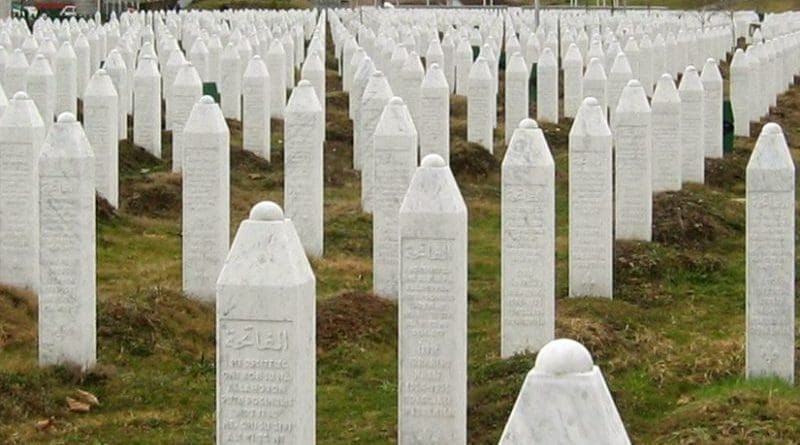Thousands Commemorate Anniversary Of Srebrenica Killings
By Haris Rovcanin
Over 20,000 people gathered at the Srebrenica memorial site in Bosnia to mourn those killed in the July 1995 massacres and bury 71 more victims whose bodies were identified over the past year.
Huge crowds of mourners gathered on Tuesday at the Srebrenica memorial site for the commemoration of the 22nd anniversary of the mass killings of Bosniaks by Bosnian Serb forces, with relatives shedding tears as 71 more victims were finally laid to rest.
Several thousand of the mourners arrived at the memorial site in the village of Potocari after having trekked across country on a three-day peace march.
The youngest victim among those who were buried was Damir Suljic, who was 15 when he was killed in July 1995 after the Bosnian Serb Army overran the UN-protected ‘safe area’ of Srebrenica and subsequently executed some 8,000 Bosniak men and boys.
Suljic was buried next to his father, grandfather and uncle, who were also killed in the massacres, Anadolu news agency reported.
The Bosniak member of Bosnia and Herzegovina’s tripartite presidency, Bakir Izetbegovic, said in a speech at the commemoration that “reconciliation cannot be achieved without justice”.
“The foundations of reconciliation must be built on justice and truth, and that will not happen until the ideology and ideas that lead to genocide are completely defeated,” Izetbegovic said.
Hague Tribunal President Carmel Agius told the commemoration that denial or distortion of what happened in Srebrenica was “an intentional assault on truth”.
Agius said that the Srebrenica genocide “is so well documented, established by two UN international courts and scientifically supported, that you will never be able to succeed in hiding the true nature of this genocide”.
Hundreds of people posted messages of commemoration on social media, including Bosnian national football team captain Edin Dzeko.
The killings have been defined as genocide by international and Bosnian court verdicts, although Bosnian Serb officials and the government in Serbia reject the definition.
Serbia’s President Aleksandar Vucic said on Tuesday however that the actions of the Bosnian Serb Army in Srebrenica in 1995 constituted a “great crime”.
“This was a terrifying crime, and my obligation as president is to express condolences to the families, and hope that such crimes will never happen again,” Vucic said in an interview with Serbia’s Happy TV.
Vucic was attacked by angry mourners when he attended the 20th anniversary of the massacres at the memorial site in 2015.
In central Belgrade on Monday, peace campaign group Women in Black held a vigil entitled ‘Srebrenica 8372’, after the number of Bosniaks known to have been massacred by Bosnian Serb forces.
United Nations secretary-general Antonio Guterres in a statement commemorating the anniversary said that the facts about the 1995 massacres should be recognised by all communities in Bosnia and Herzegovina in order to build trust and enable “full reconciliation”.
Guterres also acknowledged criticism of the UN for failing to prevent the killings of Bosniaks from Srebrenica, where UN peacekeepers were stationed.
“The international community, and in particular the UN, has accepted its share of responsibility with respect to the tragedy at Srebrenica and has worked hard to learn from the lessons of its failures,” Guterres said in his statement on Monday.
A total of 38 former members of the Bosnian Serb Army and police force have been sentenced by the Hague Tribunal and the Bosnian state court to more than 600 years in prison, plus three life sentences, for genocide and other crimes against Bosniaks from Srebrenica.

